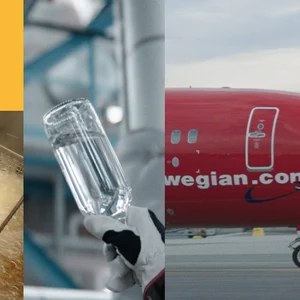From waste to wonder: How circular supply chains are reshaping energy
From waste to wonder: How circular supply chains are reshaping energy

Every day in the UK, around one million litres of used cooking oil are discarded after frying food. What is often seen as waste has the potential to become something much more valuable — a renewable energy source that can cut emissions by up to 80 percent compared to fossil fuels.
More interested in seeing this content in a video format? Have a look here.
“It’s a bit mind-blowing to reflect on the fact that the energy used to produce that oil could power a small town with electricity for a whole year,” says Neil Taylor, Managing Director of Brocklesby, a St1 owned company specialising in collecting and processing used cooking oil. “At St1, we are giving this oil a new beginning. That is pretty game-changing.”
Video on how St1 uses used cooking oil and rebuilds it into Sustainable Aviation Fuel (SAF)
Rebuilding at a molecular level
This transformation is at the heart of St1’s approach to building new energy solutions. At its Gothenburg biorefinery, St1 converts used cooking oil, animal fats and tall oil — a by-product from the forest industry — into sustainable aviation fuel (SAF) and other renewable fuels.
“In Gothenburg, we take these raw materials and rebuild them at the molecular level into jet fuel,” explains Helén Ljungqvist, Head of the Gothenburg Biorefinery. “And what’s fantastic is that it can be used right now, in all existing jet engines, without any technical modifications. Emissions are reduced from the very first tank fill.”
The Gothenburg biorefinery, opened in 2024, has an annual production capacity of 200,000 tons of renewable fuels. Each year, the fuels produced here reduce road and air traffic emissions by approximately 500,000 tons of carbon dioxide compared to their fossil equivalents.
An energy transition company
But St1’s energy transition goes far beyond aviation. In 2024, the company expanded its charging network with more than 70 new EV sites, delivered over 240 GWh of biogas to the market, and continued to grow its Nordic network of energy stations. Together with partners, St1 is now investing more than €1 billion to scale biogas across the Nordics — supporting heavy transport, agriculture and industry.
The company’s vision is to be the leading producer and seller of CO₂-aware energy, with scalable solutions ranging from sustainable liquid fuels to biogas and electrification.
As global energy demand continues to grow, the challenge is not only to supply more energy, but to supply it responsibly. For St1, the answer lies in connecting the chain — from local waste streams to global supply chains, from everyday actions to industry-wide change.
What began as waste in a fish and chip shop can now help fuel an aircraft taking off from a Nordic runway. And for St1, that journey is just the beginning.
